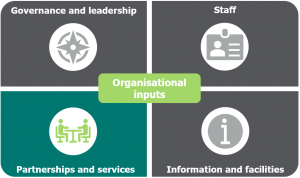Information and facilities

Key findings
- Well-designed, accessible, safe and decent physical environments support a positive working culture through enabling open and collaborative interactions, and can have a positive effect on staff morale and wellbeing.
- Staff should have access to the necessary information as soon as required to support them in making the decisions required in their specific roles, with clear up-to-date policies and procedures in place.
- Evidence must be used to learn and adapt, with good practices and areas for development and improvement identified, and the organisation taking decisive steps to improve delivery.
- The views of children should be sought to help review and improve the effectiveness of services, with a focus on inclusivity and an appropriate range of approaches being used.
- Transparency is important. There should be high levels of awareness regarding performance and effectiveness across the organisation, with evaluative and reflective practice becoming an integrated part of an organisation’s culture.
Background
Two key requirements for the delivery of a quality service are:
(i) well-designed, accessible, safe and decent physical environments
(ii) the provision of timely and relevant information, with a wide range of sources of evidence being used to drive improvement.
Summary of the evidence
Physical environments
There has been increasing research attention upon the importance of physical environments for high-quality delivery. The physical premises and offices should be accessible to both staff and the children and their families, and support a positive working culture through enabling open and collaborative interactions while meeting the requirements of safety, security, privacy and confidentiality.
Well-designed safe and decent physical environments have also been found to have a positive effect on staff morale and wellbeing.
Access to the necessary information
The highest performing organisations ensure that its people have the necessary tools do their jobs well and deliver a quality service. The Information and Communication Technology (ICT) systems and associated protocols should support effective and service delivery and robust information exchange, with the ability to record and access key information whenever and wherever required.
Staff should have access to the necessary knowledge and information, facilitated through the organisation’s ICT systems, with clear policies and procedures in place to support them in making the decisions required in their specific roles. Policies and procedures should be regularly and proactively reviewed, improved and communicated to help staff assume responsibility and act quickly and effectively.
Reviewing and improving the effectiveness of services
In strong organisations, leaders and managers have an in-depth understanding of strengths, weaknesses and capabilities. There are comprehensive arrangements in place to analyse, trend and benchmark performance, using reliable and timely information. Potential new ways of working should be explored through self-evaluation, involving all staff, and through learning from others and applying findings from reviews, research and scrutiny. Evidence must be used to learn and adapt, with good practices and areas for development, improvement, creativity and innovation identified, and the organisation taking decisive steps to improve delivery.
Crucially, the views of children should be sought to help review and improve the effectiveness of services, with a focus on inclusivity and an appropriate range of approaches being used. Recent work across Greater Manchester enabled the co-creation with justice-involved children of a transformative framework of practice, termed Participatory Youth Practice (PYP), with a focus on helping children to problem solve and find better options. The Director of Targeted Services, within one of the Greater Manchester youth offending teams, highlighted the value of this work:
because of the work we’ve done around participation in youth justice, young people are being assessed in a different way, worked with in a different way and that is a direct result of this project.
Transparency is important, with the effectiveness of service delivery being evaluated, and successes and failures being openly communicated. There should be high levels of awareness regarding performance and effectiveness across the organisation, with relevant information translated across the organisation and communicated to staff in readily-accessible formats. Attention should be given to both ‘knowledge translation’ and ‘knowledge mobilisation’ – so not simply one-way dissemination but also meaningful two-way engagement and interaction with findings and their implications. Evaluative and reflective practice can then become an integrated part of an organisation’s culture, with staff thinking critically about the evidence that underpins their actions
Our 2021 YOT Annual Report noted that the more effective youth offending teams (YOTs) were monitoring performance against national youth justice indicators and had developed and monitored their own indicators based on local priorities and issues. Both quantitative and qualitative data were being used, leading to a good understanding of local trends in youth crime and the needs and profiles of the children.
In our Research & Analysis Bulletin 2021/05 (PDF, 531 kB), we reported that across those YOTs that were performing less well, shortcomings were found in relation to the levels of communication, recording, performance monitoring, and feedback. Some YOT management boards were overly reliant on the three standard performance indicators (first time entrants, use of custody and reoffending rates), leaving them lacking detailed understanding of the performance of the YOT.
Kilkelly, U., Forde,L., Hurley, E., Lambert, S., Swirak, K., Kelleher, D. and Buckley, S. (2022). Ensuring the collaborative reform of youth justice in Ireland in line with international research and evidence-based approaches. Cork: University College Cork.
Back to Partnerships and services Next: Supervision
Last updated: 10 March 2023



